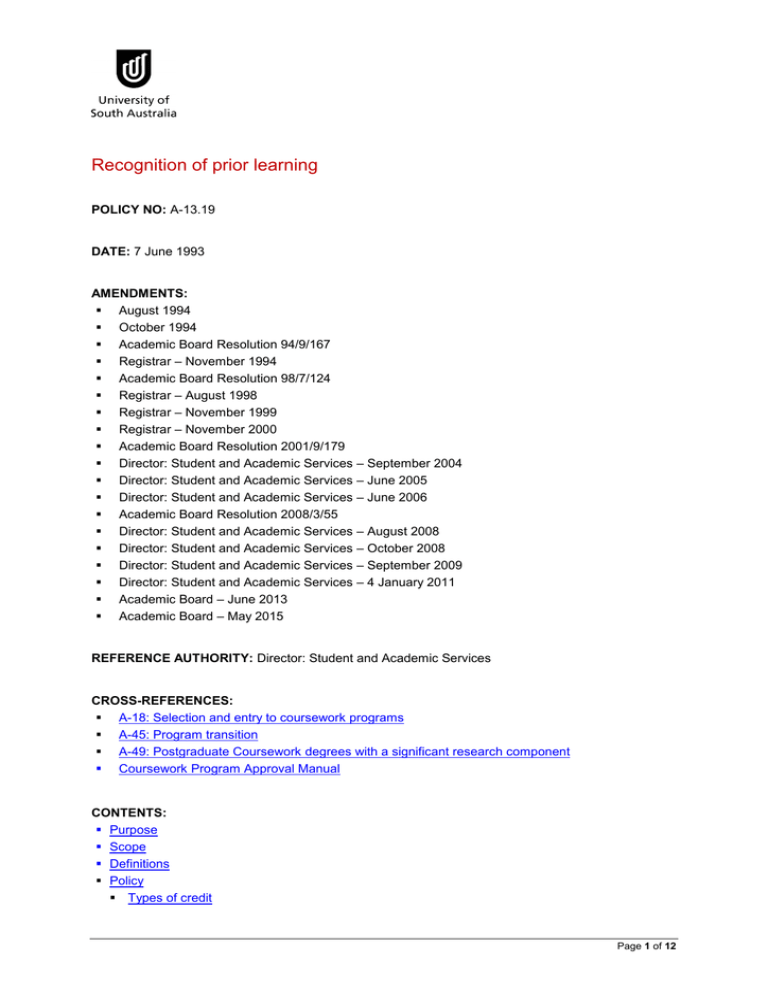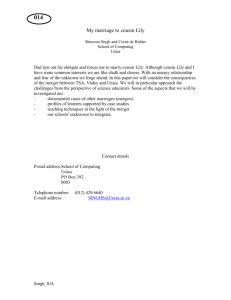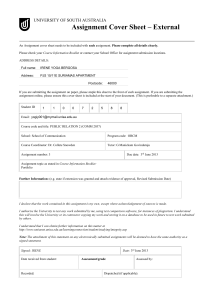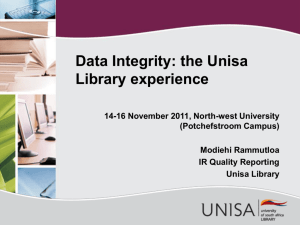Recognition of prior learning - University of South Australia
advertisement

Recognition of prior learning POLICY NO: A-13.19 DATE: 7 June 1993 AMENDMENTS: August 1994 October 1994 Academic Board Resolution 94/9/167 Registrar – November 1994 Academic Board Resolution 98/7/124 Registrar – August 1998 Registrar – November 1999 Registrar – November 2000 Academic Board Resolution 2001/9/179 Director: Student and Academic Services – September 2004 Director: Student and Academic Services – June 2005 Director: Student and Academic Services – June 2006 Academic Board Resolution 2008/3/55 Director: Student and Academic Services – August 2008 Director: Student and Academic Services – October 2008 Director: Student and Academic Services – September 2009 Director: Student and Academic Services – 4 January 2011 Academic Board – June 2013 Academic Board – May 2015 REFERENCE AUTHORITY: Director: Student and Academic Services CROSS-REFERENCES: A-18: Selection and entry to coursework programs A-45: Program transition A-49: Postgraduate Coursework degrees with a significant research component Coursework Program Approval Manual CONTENTS: Purpose Scope Definitions Policy Types of credit Page 1 of 12 Advanced Standing Maximum credit Authority to approve credit Using an assessment task to determine credit Applying for credit Outcome of a credit application Recording credit Appeals Appendix A – Credit transfer framework Appendix B – Contextual factors Appendix C – Process for determining block credit for related and unrelated programs at TAFE SA and the Australian Defence Force (ADF) Purpose UniSA recognises prior learning by granting credit or advanced standing towards the requirements of University award programs. The prior learning may be from: a recognised higher education provider a TAFE or other Vocational Education Training (VET) provider a professional body, enterprise, or private educational institution work experience or practical experience, including voluntary work life experience This policy is based on the following broad principles: providing opportunities for students to proceed from one level of education/training to another facilitating student progress, completion and mobility recognising knowledge and skills that students have gained, which meet the learning outcomes of University award programs setting entry requirements that recognise prior learning and reduce program duration where appropriate granting maximum recognition for prior learning granting credit using a consistent and equitable approach across UniSA ensuring clear, publicly available credit provisions Scope This policy applies to all future and current students in UniSA undergraduate and postgraduate coursework programs and enabling programs. The policy does not apply to higher degree by research students or to students undertaking short programs (see policy A-53: Short Programs). Definitions Advanced Standing recognises that a student may have completed previous qualifications which can reduce the duration of a Masters program. Page 2 of 12 Policy A-13.19: Recognition of prior learning Articulation is specific design within education and training programs to facilitate and maximise opportunities for students to proceed from one level of education/training to the next. Confirmation of Enrolment (CoE) is a form issued by UniSA to international students studying in Australia on a student visa, for student visa purposes. Credit is the recognition of prior learning granted towards the requirements of an award program on the basis of prior study or prior work and/or life experience. The Credit Assessor is a data base that lists existing precedent for credit arrangements and formal credit transfer agreements between UniSA and other providers. International student is a student who is studying in Australia on a temporary visa, or a nonAustralian citizen who is studying overseas via online or distance education. Students enrolled in a program delivered by an offshore partner are not considered international students. Policy 1. Credit for prior learning is granted only where the prior study or experience is assessed as equivalent in content and learning outcomes to the courses for which credit is being sought. 2. Credit decisions should preserve the broad integrity and the intended Graduate Qualities profile of the program. 3. UniSA credit arrangements support the Australian Qualifications Framework Qualifications Pathways Policy. 4. Credit is not automatically granted in all programs. Program rules determining credit are available on the program pages of the UniSA website. 5. Eligibility for credit does not guarantee an applicant admission to a program. 6. Advice on indicative credit can be provided to future students, but a final decision on credit will not be made until a student is admitted to a program. A final decision on credit will be made for an international student when an offer is made to the student. 7. Credit granted must be academically defensible and take into account the student’s capacity to progress and complete their program requirements. 8. Program specific requirements must be fulfilled, for example conditions associated with professional accreditation. 9. Credit will not normally be granted for learning completed more than ten years before the time of application unless there is evidence of substantial relevant experience during the intervening period. Program specific requirements may apply whereby previous learning must have been completed within a shorter period before the time of application. 10. The program director determines the total amount of credit that may be awarded in a program, subject to the maximum allowable credit outlined in clause 21 of this policy and Appendix C. 11. Decisions on the type of credit granted must be made in accordance with: a. this policy, and b. agreements with other providers, and c. procedures and frameworks approved by division boards or equivalent bodies. 12. Formal credit transfer agreements may be established with TAFE, the Australian Defence Force, and other education and training providers in Australia and other countries. These agreements must be approved by division boards or equivalent bodies. Page 3 of 12 Policy A-13.19: Recognition of prior learning 13. Divisions must record all credit granted in accordance with precedent or existing credit transfer agreements in the Credit Assessor. 14. Divisions must record all agreements with other providers in the Credit Assessor. 15. In special circumstances, for example where the applicant is unable to present sufficient documentary evidence to allow for the normal determination of credit, the applicant may be allowed to undertake an assessment process, which may be written. Authority to make this decision resides with the relevant program director, in consultation with the course coordinator and other academic staff as appropriate. 16. If a student undertakes internal transfer, credit approved for the original program will not automatically be transferred. Students reapply for credit under the new program. Advice on possible credit may be provided to future students on request. However a final decision on credit will not be made until the student is admitted to the program. 17. Transition credit arrangements will be managed in accordance with policy A-45: Program Transition. 18. UniSA is not obliged to make arrangements for individual students if timetable clashes or unacceptable study combinations arise from a credit arrangement. 19. Types of credit at UniSA 19.1 Block credit recognises completion of a previous qualification that contains equivalent learning. It is expressed in units. Courses for which credit is provided are listed. 19.2 Specified credit is granted for part of a program when: a. the student has completed curriculum that is substantially the same, and b. the completed curriculum constitutes at least the same proportion of full time study, and c. the student has attained at least a pass standard in that prior learning. 19.3 Unspecified credit is granted when there is no equivalent component in the UniSA program. Unspecified credit is usually granted as an elective. 19.4 Exemption is a release from specified parts of a course, or an assessment task, or part of an assessment task. No reduction in fees or student contributions occurs when a student obtains an exemption. 19.5 Exemption cannot be granted for work completed in a course that the student has previously failed, unless the student requests an exemption before re-enrolling in the course. 19.6 Studies in lieu are granted when a student undertakes alternative work in place of a specified course. 20. Advanced Standing 20.1 UniSA uses Advanced Standing in Masters programs only. 20.2 Advanced Standing recognises prior studies and experience at a level and/or in a discipline that satisfies the requirements of the early courses in a Masters program. 20.3 To claim Advanced Standing, students must demonstrate that they have completed studies in a discipline area or at an appropriate level that would allow them to claim 18 or 36 units of a Masters program. Page 4 of 12 Policy A-13.19: Recognition of prior learning 20.4 Students may be able to use a combination of credit and Advanced Standing to reduce the duration of their Masters program. However, credit amounts remain subject to the maximum credit amounts prescribed in this policy. 20.5 Students are not required to apply for Advanced Standing. Campus Central, UniSA International or Offshore Administration will advise the student whether they have obtained Advanced Standing and record it on the student’s file. 21. Maximum Credit The maximum credit allowed is specified as follows. Variations from the maximum must be approved by division board. 21.1 Enabling Programs A maximum of one half of the total units towards a UniSA enabling program where the program is 36 units or more in length. No credit is available towards UniSA enabling programs that are less than 36 units in length. 21.2 Diploma A maximum of two thirds of the total units towards a UniSA two-year diploma. 21.3 Associate Degree A maximum of two thirds of the total units towards a UniSA Associate Degree. 21.4 Undergraduate Degree Students must complete the equivalent of at least one year full time study in a single UniSA undergraduate degree program. 21.5 Double Degree Students must complete the equivalent of at least one year full time study from each contributing program in a UniSA double degree. 21.6 Honours Degree A maximum of one third of the total units towards a UniSA honours degree. No credit can be claimed towards the research project component. 21.7 Graduate Certificate A maximum of one thirds of the total units towards a UniSA Graduate Certificate. Additional credit can be granted for non-award courses undertaken at UniSA. 21.8 Graduate Diploma A maximum of one third of the total units towards a UniSA Graduate Diploma. Additional credit can be granted for non-award courses undertaken at UniSA. Credit can be claimed for a Graduate Certificate undertaken as part of a UniSA nested suite. 21.9 Masters by Coursework A maximum of one third of the total units towards a UniSA coursework Masters. Additional credit can be granted for non-award courses undertaken at UniSA. Credit can be claimed for a Graduate Certificate or Graduate Diploma undertaken as part of a UniSA nested suite. Advanced Standing rules apply in addition to credit rules. 21.10 Professional Doctorate A maximum of one third of the total units towards a UniSA Professional Doctorate. 21.11 Division board must report to Academic Standards and Quality Committee to justify any credit arrangements that vary from this policy. Page 5 of 12 Policy A-13.19: Recognition of prior learning 22. Authority to approve credit 22.1 Authorised professional staff may approve credit applications when there is clear precedent or an existing credit agreement. Professional staff should seek advice from the program director if required. 22.2 If academic assessment is required, the program director must approve the credit application. 23. Using an assessment task to determine credit 23.1 If a program director allows an applicant to demonstrate prior knowledge through an assessment, the course coordinator is responsible for arranging, administering and marking the assessment, and will advise the student and program director of relevant arrangements. 23.2 The assessment should gauge whether the applicant’s prior learning is comparable in content and standard with the course(s) for which they are seeking credit. Credit should be granted when the applicant completes the assessment with at least a ‘pass’ result. 24. Applying for credit 24.1 The processes of applying for and assessing credit towards UniSA programs do not attract a fee. 24.2 Applications for credit in domestic programs must be made on the prescribed form accompanied by supporting documents, and lodged with Campus Central. 24.3 The admissions process for offshore students includes credit processes. UniSA International and/or Offshore Administration are responsible for managing the admissions process for offshore students. 24.4 Applications for credit can be lodged at any time before enrolment. After enrolment, applications must be lodged at least two weeks before the census date for that study period. This allows decisions about credit to be made in a timely way. 24.5 Completed applications are retained on the student’s record. 25. Outcome of a credit application 25.1 The relevant academic or professional staff member will annotate the application form indicating the decision and reasons or conditions, and return it to Campus Central, UniSA International or Offshore Administration as applicable. 25.2 Campus Central, UniSA International or Offshore Administration will: a. advise the applicants of the outcome in writing, and b. record the decision on the student record system. 25.3 Credit and program duration for international students must be reflected in the CoE. If the amount of credit to which the student is entitled operates to shorten the program duration after a student visa is issued, Campus Central will provide the student with a revised CoE. 26. Recording Credit 26.1 Credit can be recorded as: a. specified courses, and/or b. a specified number of units within a particular area of the program, and/or Page 6 of 12 Policy A-13.19: Recognition of prior learning c. transition credit, and/or d. a qualifying requirement to complete the award. 26.2 Credit will not be graded or included in the student’s grade point average unless this is part of the agreement between UniSA and another provider, and that provider’s courses and results are displayed on the student record system. 26.3 Credit towards a UniSA program will be displayed on the student record system when the credit has been granted from courses completed in another UniSA program. 26.4 The credit record should include the names and/or codes of courses for which the credit has been granted and a description of the credit granted. 27. Appeals 27.1 A student who is dissatisfied with a decision relating to credit may lodge a written appeal with the head of school responsible for the program. 27.2 A student who is dissatisfied with the decision of the head of school can appeal to the Credit Appeals Committee only on the grounds that this policy has not been complied with. 27.3 The Credit Appeals Committee is a sub-committee of Academic Board. Members include three academic staff nominated by the Chair of Academic Board, and an Executive Officer from Student and Academic Services. 27.4 The Credit Appeals Committee decision is the final avenue of appeal within UniSA. Students can appeal separately through external avenues such as the State Ombudsman or the Office of the Training Advocate. Page 7 of 12 Policy A-13.19: Recognition of prior learning APPENDIX A: CREDIT TRANSFER FRAMEWORK 1. 2. Credit for higher education, as defined in the Higher Education Support Act 1.1 Courses which are part of higher education award programs may be recognised for credit towards UniSA awards. 1.2 Credit can also be granted for non-award programs and courses undertaken at higher education providers. 1.3 Credit will be granted for a course where there is substantial overlap of content and/or learning outcomes with a UniSA course. 1.4 Schools may approve block credit for major sequences of study. Where these major sequences do not meet the UniSA program requirements, the school must devise a program of study that allows the student to meet the requirements in the minimum time. Credit for TAFE studies 2.1 Credit transfer arrangements must be documented using the prescribed form and approved by the division and TAFE. 2.2 Credit transfer arrangements should maximise credit without compromising the prospects of student success. 2.3 Credit arrangements must preserve the professional accreditation or recognition of UniSA awards. 2.4 Completed TAFE awards may be used for both entry and credit towards UniSA awards. 2.5 Credit can be granted horizontally for individual courses at introductory levels. It can also be granted vertically for sequences within a program. 2.6 UniSA will grant a minimum amount of block credit towards its undergraduate programs for completed TAFE awards at Certificate IV and above. This applies unless there are program-specific reasons why credit should not be granted. 2.7 No credit will be granted towards a UniSA undergraduate degree for TAFE awards below a completed Certificate IV, unless a strong case can be made. 2.8 Additional block credit can be granted for other TAFE awards to provide the applicant with credit beyond the minimum amount, but the amount of credit granted cannot exceed the maximum specified in this policy. 2.9 The UniSA courses for which block credit is granted must be specified in the Credit Assessor, and also in the program schedule/notes in the program approval documentation, which is then published on the UniSA program website pages. 2.10 Block credit decisions are managed by program administrators, reported to the division, and entered in the Credit Assessor, to set a precedent for future applications. 3. Credit for studies undertaken at a registered provider 3.1 UniSA recognises prior learning for courses that form part of an award accredited under the Australian Qualifications Framework, or that are recognised internationally. 3.2 UniSA may grant block credit for a completed accredited award program if: a. UniSA has been directly involved in the program development, or b. the program articulates with a specific UniSA program, or c. the program contains content equivalent to a UniSA program. Page 8 of 12 Policy A-13.19: Recognition of prior learning 4. Credit for prior learning from work and/or life experience 4.1 Credit may be granted for work or life experience where this learning can be demonstrated. The applicant must provide evidence that their uncertified training or experiential learning provides the skills, knowledge and understanding equivalent to outcomes that they would have gained by completing the required UniSA courses. 4.2 The program director will assess the credit application and will take into account: a whether the applicant can demonstrate the learning outcome that is being claimed (authenticity), and b whether the learning outcome is still valid (currency) and c whether the learning is relevant (relevance) and d whether the learning has reached the required level (quality) and e whether the learning outcome can be applied outside the context in which it was learned (transferability). Page 9 of 12 Policy A-13.19: Recognition of prior learning APPENDIX B: CONTEXTUAL FACTORS The primary consideration when assessing an application for the recognition of prior learning is whether the prior learning is equivalent in content and learning outcomes to the courses(s) for which credit is being sought. The following factors may help decision-makers in assessing the standard of prior learning: 1. the educational practices and standards of the provider(s) 2. program-specific objectives and methods for achieving them 3. program admission requirements 4. program duration 5. breadth, depth, and balance in the program material and the intellectual effort required 6. procedures for approving research projects if applicable 7. methods used to assess student progress, including the use of external examiners for higher degrees. 8. the relative emphasis on learning skills related to the discipline 9. opportunities for any practical training and experience 10. the teaching staff conducting the program, including numbers, qualifications and experience, and expertise 11. accommodation and facilities such as equipment, library, laboratories, workshops and other resources 12. transfer arrangements between programs Page 10 of 12 Policy A-13.19: Recognition of prior learning APPENDIX C: PROCESS FOR DETERMINING BLOCK CREDIT FOR RELATED AND UNRELATED PROGRAMS FROM TAFE SA AND THE AUSTRALIAN DEFENCE FORCE (ADF) 1. Identify the amount of credit for generic skills for the TAFE or ADF qualification, taking into account the UniSA program’s Graduate Qualities profile. Specify the course(s) in the UniSA program for which the minimum block credit will be granted. 2. Identify the core TAFE or ADF courses which students must have undertaken to achieve more than minimum block credit. Make a judgment about the amount of credit that will be granted. There will seldom be an exact match. Credit should be provided where the match is 75% or better. 3. Consider the discipline-specific TAFE or ADF electives, where students choose electives that have similarities. Identify the amount of credit that will be provided. 4. The credit identified in steps 1, 2 and 3 above constitutes block credit for a particular award and should be registered on the Credit Assessor. All students applying to UniSA would receive this amount of credit. Students seeking additional credit (Step 4) will need to apply directly to the program director. 5. Identify any ‘free’ electives undertaken in the TAFE or ADF award. Identify the amount of credit that will be provided. 6. In some instances no credit can be given due to the requirements of professional bodies. 7. Credit granted must not exceed the provisions of this policy. Table 1: Minimum and maximum credit at UniSA for TAFE SA or ADF programs of study TAFE/ADF Qualification Minimum credit for UniSA award (for related or unrelated programs) Recommended maximum credit for UniSA award (for related programs) Certificate IV 4.5 units for 2 year award 4.5 units for 3 year award 4.5 units for 4 year award 9 units for 2 year award 9 units for 3 year award 9 units for 4 year award Diploma 9 units for 2 year award 9 units for 3 year award 9 units for 4 year award 13.5 units for 2 year award 13.5 units for 3 year award 13.5 units for 4 year award 18 units (25%) for 2 year award 36 units (33%) for 3 year award 36 units (25%) for 4 year award 36 units for 2 year award 54 units (50%) for 3 year award 54 units (37.5%) for 4 year award 13.5 units for 2 year award 13.5 units for 3 year award 36 units (50%) for 2 year award Up to 72 units for non-articulating awards in 3 year award 72 units for articulating awards in 4 year award Advanced Diploma Associate Degree 13.5 units for 4 year award Credit for any previous study permitted by this policy 36 units (50%) for 2 year award 72 units (66%) for 3 year award 108 units (75%) for 4 year award Page 11 of 12 Policy A-13.19: Recognition of prior learning Page 12 of 12 Policy A-13.19: Recognition of prior learning






